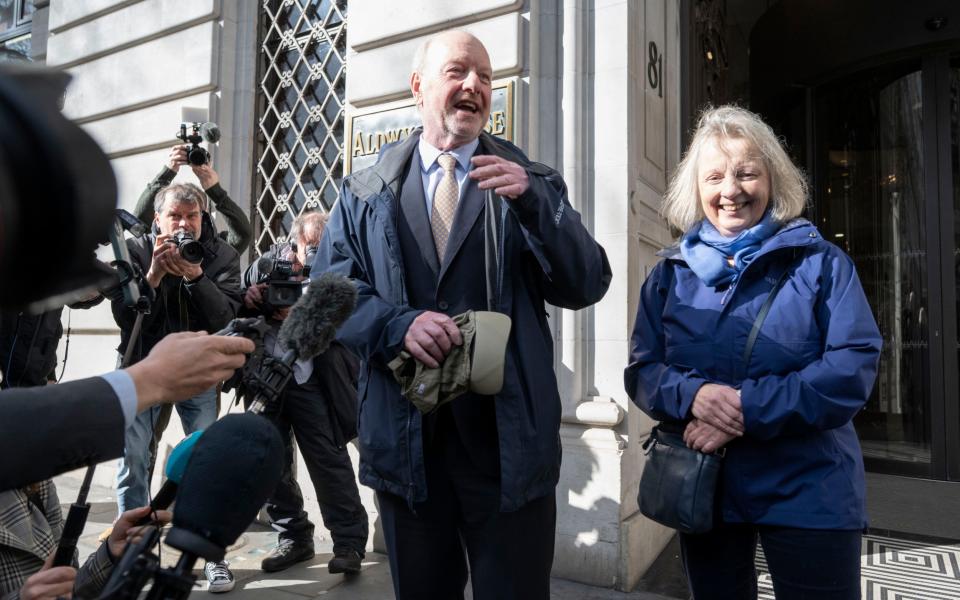Alan Bates rejects second offer of compensation following Post Office Horizon scandal

Alan Bates has rejected a second offer of compensation for the Post Office Horizon scandal, as the former sub-postmaster said he was readying himself for an “ongoing uphill struggle” with his claim.
The campaigner, whose fight for justice inspired the ITV drama Mr Bates vs The Post Office, turned down a “derisory” offer from the Government in January, which amounted to “around a sixth” of what he had asked for.
He has since rejected a second offer, which he says is around 30 per cent of the sum for financial redress which he was seeking.
Mr Bates has fought a two-decade battle with the Post Office, initiated by the organisation’s decision to terminate his contract at his Llandudno branch in 2003, when he refused to accept blame for shortfalls on his account.
His campaign would go on to expose the Horizon scandal, which saw more than 900 sub-postmasters wrongfully prosecuted after the software incorrectly recorded shortfalls on their accounts between 1999 and 2015.
Speaking to The Telegraph, he said: “I mean we obviously challenged the initial claim and now it’s gone back and come again. It seems to be an ongoing uphill struggle, not just for me, but for other sub-postmasters too.”
Mr Bates added: “The whole thing seems to be cloaked in secrecy not transparency, which you would hope it would be.”
Following the termination of his contract, Mr Bates and wife, Suzanne Sercombe, kept their shop but lost their Post Office counter and their investment of around £60,000.
After setting up a website, he met other sub-postmasters and sub-postmistresses who had experienced similar problems.
‘Bugs, errors and defects’
Along with 554 others, he took the Post Office to the High Court, where a judge ruled in 2019 that the Horizon system used to run accounts contained “bugs, errors and defects”.
The claimants were awarded £58 million in a settlement from the Post Office. However, once legal costs were deducted they received only £12 million – around £20,000 each on average.
The Government set up a compensation scheme for these postmasters called the Group Litigation Order (GLO). It opened last year and was set up to ensure the claimants involved in the legal action received extra money to reflect the gravity of their situations.
Interim payments have been paid out, while claimants await an offer for the final payment.
Applicants in this scheme can also opt to settle their claims on a full and final basis for a total fixed sum of £75,000, inclusive of interest, instead of making a claim for their individual losses.
Stressing that other victims are also becoming frustrated with the delays, Mr Bates said: “Quite a few people are also claiming for how family members have been affected – but the Government is not accepting this and that’s obviously a source of contention.”
Giving evidence at the Post Office Horizon IT Inquiry last month, Mr Bates was asked whether, from his perspective, the process of “seeking and obtaining redress” had been “efficient and effective”.
“No,” he responded.
Next week, former Post Office chief executive Paula Vennells will give evidence to the inquiry.
When asked what he wished to hear from her, Mr Bates said: “I’d actually like to hear the truth.”
A Department for Business and Trade spokesman said: “We pay tribute to the incredible campaign that Alan has led and his determination to get justice for the thousands of innocent postmasters affected by this scandal.
“We have already paid out £202 million to postmasters across the three compensation schemes and as with any offer, if claimants are unhappy their cases can be resolved by an independent panel, which is made up of legal, medical, retail and accountancy experts, to ensure fair redress is offered based on the evidence.”

 Yahoo Sport
Yahoo Sport 






































